
Sen. Pat Toomey is leading a Republican push to curtail the Federal Reserve’s emergency lending authority in the economic relief deal taking shape, a move that would seal off major avenues of future aid without congressional action.
The language would prevent Treasury Secretary-designate Janet Yellen from restarting Fed lending programs for small and midsized businesses, as well as for state and local governments, that are set to wind down at the end of the year. Toomey, a Pennsylvania Republican, said the move had “very broad support” from Senate Republicans.
The bill would prevent any money from the Treasury’s rainy day fund, even money not set aside in March as part of the CARES Act, from being used to resume those programs after 2020. It would also prohibit any similar programs from being created in the future.
In a call with reporters Thursday, Toomey said he was “hoping and expecting” that the language would be included in a final agreement.
“This is the most important thing to me,” he said, adding that it was about “preventing the Fed from being politicized” and misused by being pressured into bailing out municipalities and companies.
“This is not at all an effort to in any way hamstring the Biden administration or weaken our economy,” Toomey said.
The provision takes some power away from the Fed just as Joe Biden prepares to enter the White House and the economy is facing a new slowdown amid a resurgence of the coronavirus.
But Toomey said only the handful of programs that are backed by money from the CARES Act would be affected by the provision. “This is not a broad rewrite of” the Fed’s emergency powers, he said.
Since the Great Depression, the central bank has had the authority in emergency situations to lend to any borrower to ensure the proper functioning of financial markets.
The Fed used that authority expansively during the 2008 financial crisis, including to bail out firms deemed too interconnected in the economy to fail, such as AIG. Afterward, in the landmark 2010 Dodd-Frank Act, Congress required the central bank to only create “broad-based” lending programs for a subset of companies, rather than lending only to a single firm. It also required the Treasury secretary to sign off on any such programs.
At the onset of the pandemic, when key debt markets began freezing up, the Fed employed many of the same emergency programs as in 2008, such as lending to companies against collateral ranging from bundled credit card loans to packages of loans to highly indebted businesses. That program is designed to spur more loans to consumers and businesses by increasing demand for securities containing those loans.
The Fed and Treasury used CARES Act funds to cover any losses under that program. That means — under the restrictions advocated by Toomey — the central bank would never be able to open another similar program without congressional approval.
The central bank also wouldn’t be able to take many of the actions that were newly deployed in this emergency, including the municipal lending program and “Main Street” business lending program, which were created at the behest of Congress.
And it wouldn’t be able to buy up corporate bonds as it did after economic shockwaves from the pandemic sparked a panic and raised fears of a full-blown credit crunch. That program has been the Fed’s most controversial during this crisis, but lawmakers including Toomey have praised it as successfully restoring order to allow companies to continue borrowing cheaply without needing to turn to the government.
For its part, the Fed has said it would like the emergency programs to remain operating until the crisis has ended. Still, Chair Jerome Powell has said he accepted Treasury Secretary Steven Mnuchin’s interpretation that the programs should cease at year end.
He avoided answering at a press conference Wednesday on whether he would accept a new interpretation from a new Treasury secretary. He also declined to say whether the central bank had plans for any future emergency programs.
“We have the authorities we have, we will use them if they’re needed and if the law permits us to do so,” Powell said.
"emergency" - Google News
December 18, 2020 at 02:29AM
https://ift.tt/3nwmLLo
Relief bill could slam door on Biden’s ability to extend emergency economic support - POLITICO
"emergency" - Google News
https://ift.tt/2VVGGYQ
https://ift.tt/3d7MC6X
emergency
Bagikan Berita Ini














0 Response to "Relief bill could slam door on Biden’s ability to extend emergency economic support - POLITICO"
Post a Comment